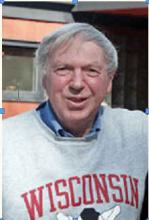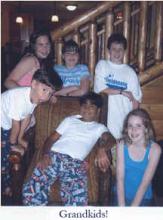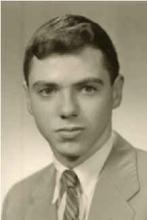Deceased December 25, 2009
View alumni profile (log in required)
Read obituary
In Memory
Allen N. Fit chen, "Skip" to all of us in ’58, died Christmas morning, December 25, 2009 at the age of 73 following a sixteen-year siege with lung cancer. Just outside the window of his room at the hospice facility for his last few weeks, family members hung seed and suet for his beloved birds. Very few came until Christmas Eve, but the next morning, as the card sent by the family noted, "a sudden profusion of birds – some in pairs – filled the tree. Cardinals, chickadees, nuthatches, doves, downy and hairy woodpeckers all made appearances. Since they didn’t feed and stayed less than a minute, they must have had a higher mission. We hoped Allen sensed it and that his spirit responded."
chen, "Skip" to all of us in ’58, died Christmas morning, December 25, 2009 at the age of 73 following a sixteen-year siege with lung cancer. Just outside the window of his room at the hospice facility for his last few weeks, family members hung seed and suet for his beloved birds. Very few came until Christmas Eve, but the next morning, as the card sent by the family noted, "a sudden profusion of birds – some in pairs – filled the tree. Cardinals, chickadees, nuthatches, doves, downy and hairy woodpeckers all made appearances. Since they didn’t feed and stayed less than a minute, they must have had a higher mission. We hoped Allen sensed it and that his spirit responded."
Skip was a quiet man, unassuming, content to stay in the background, even uncomfortable with large gatherings, but very much his own person. He could be quite competitive (for example, in tennis, squash, or family touch football games on Chicago’s Midway, with sometimes surprising results). He was exceedingly well organized, had a sense of humor, a wide circle of friends, loved to travel, and was not a stranger to good times.
Our memories of Skip began with the initial formation, sustained through the College years and then renewed forty years later, of that remarkable trio – Skip, Dave Stephens, and Chris Horton. Hal Scutt remembers Skip as the quiet one of the three, but no less a full member for being so. Indeed, they were so close they often referred to one another in the third person as "NipBananaHorts," very much a unit but, still, three quite different people. Skip’s first wife, Jane Cady Fitchen, recalled with some amusement that in her freshman year at Mt. Holyoke, she dated all three of them, however casually – mind you, that was while the three were rooming together at Psi U! The affinity of personalities finally settled things, and Skip married Jane in 1959 and whisked her out of Mt. Holyoke to Cornell where Skip earned his masters in English a year later.
Jane fondly recalls the weekend social life at Psi U, especially the toga party. She remembers the football games, constant music – jazz (Erroll Garner) and classical, hilarious conversations, the libations, and activities at Psi U punctuated occasionally by bottles of home brew exploding upstairs under the brewer’s bed. And constantly, there were the conversations with Skip about books, and books, and more books.
Immediately out of Amherst Skip taught for a year – apparently a long year according to his fellow teacher and friend Cliff Terry – at Northfield Mt. Hermon, the New England prep school. He taught English, lived and ate with the boys in the dorm, coached three sports, and otherwise found somewhat chafing the niceties of that other time and place. Asked to give a sermon in Chapel, he instead read passages – remember, this was 1959 – of Catcher in the Rye believing it would speak more directly to his audience, the younger one, at any rate.
He and Cliff would let off steam at watering holes in the vicinity of school. Early on, when a bartender wondered if they weren’t really just students at Mt. Hermon, a gruff voice at the end of the bar emanating from, it turned out, the football coach, said he’d vouch for their teacher status. Another time, Skip passed himself off as a LIFE reporter to a comely ecdysiast whose nom de plume was "Tootsie Roll." He interviewed her on pub life in the area and assured her that the LIFE photographer would follow up in a day or two. Right!
Skip was hired by Macmillan, first as a college textbook salesman in Ohio, then as an Editor inNew York. In 1967 Skip joined the University of Chicago Press as Humanities Editor. He was an avid recruiter of ground-breaking scholarly writers including Wayne Booth, Jacque Derrida, Mircea Eliade, Frank Lentricchia, Martin Marty, W.J.T. Mitchell, and Jaroslav Pelikan. His approach reflected clear ideas of what he wanted to accomplish. Over the years every contact with writers would be fastidiously recorded in detailed memoranda prepared immediately following each of the many trips to recruit, cultivate and assess the progress of his authors. He took no notes; everything was done from memory.
Arguably the most famous of Skip’s accomplishments as an editor/publisher was bringing A River Runs Through It by Norman Maclean to the public when Skip was senior editor of the University of Chicago Press. The feat was notable because the University of Chicago Press had never published a work of fiction. It is every editor’s dream to have a classic piece of literature dropped into his lap and to shepherd it through the publishing process. Allen lived that dream when, in 1974, Norman Maclean walked into his office at the University of Chicago Press and handed him the manuscript that would become a legend. The novella, which would be made into the popular movie by Robert Redford, is considered by many anglers to be one of the best stories ever published about fishing.
Although best known, Maclean’s book was not Skip’s only important career contribution. He diversified Chicago’s list in the humanities, greatly expanded the lists in religion and philosophy, introduced lists of popular culture, enabled major contributions in cartography and its history, and cultivated poets including Howard Nemerov whose "Collected Poems" won a National Book Award.
Skip and Jane hosted dinner party salons while at Chicago, embracing writers with whom he was or wanted to work. They were the talk of the Press. The bar was always well provisioned, and Jane remembers her culinary efforts (even as she sometimes wonders, still, if all of their guests could!) as well as often serving as designated driver, before it came to be called such, transporting guests to their respective hotels. A month after Skip died, in testimony to his lasting impact on the press, nearly a dozen friends still there nearly thirty years after he left, gathered for lunch to swap stories at a local pub Skip himself had gone to many times.
Jane suspects Skip had a hankering to write his own material, not just midwife the efforts of others. She remembers him retreating to the basement to write short stories which she never saw and which were never published. 
In 1982, Skip moved to Madison to become Director of the University of Wisconsin Press.
There his role was more, though not exclusively, administrative. In the creative vein he campaigned for ten years and finally got the University of Wisconsin Press to publish John Bishop’s classic study of James Joyce’s Finnegans Wake. Four years after moving to Madison, Skip and Jane divorced; two years after that Skip married Shirley J. Bergen, a Wisconsin native. When Skip, Shirley, Chris Horton, and Sherry took the "truly fantastic three-week sojourn [2002] in Provence and Tuscany" about which Skip wrote for the 50th Classbook, there was something about his organizational ability he didn’t tell us. (It was clearly implied, though, by his revelation there of the existence of more than 30 volumes of "Trip Reports" documenting Skip and Shirley’s travels). Just as Chris prepared note cards on significant aspects of every museum scheduled on their itinerary, Skip hauled along a small library of his birding books to be absolutely sure that any new "ticks" (for non-birders, a tick means adding a species to one’s life list) were grounded on precise descriptors. (The ethics of birder behavior in the "ticking" process is of some moment; it’s all self report, often on a very fleeting glance or mere vocalization, only sometimes supported by other pairs of eyes and ears.)  In his approach to birding many of Skip’s characteristics were on full display. He went at it very much as a scholar, hence the small library he hauled with him to Tuscany and Provence. Just as with his authors, he was relentless in his pursuit of birds. His brother John, also a birder, remembers their putting 1800 miles on the odometer just within the confines of one week and the boundaries of southeast Texas. Over his birding career Skip accumulated a life list of over a thousand species, more than 600 within the boundaries of the American Birding Association area. John recalls the competition between him and his brother, especially the discussions of the "cost per bird" as they planned trips in hopes of adding new ticks. (One trip to AttuIsland costing $6000 earned John 20 ticks – you do the math! Attu is so situated geographically that it often briefly hosts errant Asian species whose relief at finding land must be jolted by the sight of scores of pairs of birder binoculars pointed up at them.) John’s journey roused Skip’s competitive juices; it wasn’t long before he and Shirley hied themselves off to Costa Rica and Belize to fatten his world list! Cliff Terry remembers with quite apparent lingering fright – as does Jane – the hair-raising U-ies Skip would effect as he’d race back to confirm a tick he’d thought he caught a glimmer of as they were driving past!
In his approach to birding many of Skip’s characteristics were on full display. He went at it very much as a scholar, hence the small library he hauled with him to Tuscany and Provence. Just as with his authors, he was relentless in his pursuit of birds. His brother John, also a birder, remembers their putting 1800 miles on the odometer just within the confines of one week and the boundaries of southeast Texas. Over his birding career Skip accumulated a life list of over a thousand species, more than 600 within the boundaries of the American Birding Association area. John recalls the competition between him and his brother, especially the discussions of the "cost per bird" as they planned trips in hopes of adding new ticks. (One trip to AttuIsland costing $6000 earned John 20 ticks – you do the math! Attu is so situated geographically that it often briefly hosts errant Asian species whose relief at finding land must be jolted by the sight of scores of pairs of birder binoculars pointed up at them.) John’s journey roused Skip’s competitive juices; it wasn’t long before he and Shirley hied themselves off to Costa Rica and Belize to fatten his world list! Cliff Terry remembers with quite apparent lingering fright – as does Jane – the hair-raising U-ies Skip would effect as he’d race back to confirm a tick he’d thought he caught a glimmer of as they were driving past!
 Skip was a man at home with books, intellectual repartee, and the sanctity of the cocktail hour. He was comfortable at the dinner table, on the road, in his editorial offices, with birds, and the woods. (Or maybe, should it be said more precisely, cutting wood? His son Chris remembers his father enlisting him and his brother, Bill, to the Forest Preserve one winter day in a bit of a blizzard to reclaim fallen – or still standing – dead trees. Norman Maclean was there, too. While the boys worked a six-foot, two-man saw, the two seniors "sat on a stump drinking Irish Whiskey while yelling encouraging comment and keeping a keen eye out for the law [apparently cutting wood in the Forest Preserve is frowned upon in Chicago].")
Skip was a man at home with books, intellectual repartee, and the sanctity of the cocktail hour. He was comfortable at the dinner table, on the road, in his editorial offices, with birds, and the woods. (Or maybe, should it be said more precisely, cutting wood? His son Chris remembers his father enlisting him and his brother, Bill, to the Forest Preserve one winter day in a bit of a blizzard to reclaim fallen – or still standing – dead trees. Norman Maclean was there, too. While the boys worked a six-foot, two-man saw, the two seniors "sat on a stump drinking Irish Whiskey while yelling encouraging comment and keeping a keen eye out for the law [apparently cutting wood in the Forest Preserve is frowned upon in Chicago].")
Skip’s life touched a host of others – family, colleagues and authors, friends from childhood, college, and travel. Each carries memories and souvenirs of the relationship. We mourn his passing.
Skip is survived by his wife, Shirley J. Bergen; his former wife, Jane Cady Fitchen; his [5] brother John ’67; his daughter, Anne Fitchen Currier; and sons, Christopher and William; his stepdaughter, Eleni Otto; and six grandchildren.
Hendrik Gideonse ’58
Many, either in person or from published sources, contributed to the development of this piece from which the abbreviated version in AMHERST was abstracted. Cliff Terry, John Fitchen ’67, Chris Fitchen, Anne Stephens, Sherry Horton, Jane Cady Fitchen, Hutch Tibbetts, and Martin Gross were interviewed and written materials (e-mails, remembrances, obituaries, etc.) from Hal Scutt, Chris Fitchen, Fred Greenman, Joe McDonald, Ron Seely, James Janega, Vertelle Kanyama, Sherry Horton, Margaret Mahan, and John Fitchen provided additional sourcing. Shirley Bergen was addressing health issues during the initial preparation of this remembrance, but when she improved, she and her niece Denise were able to review and respond to the late drafts. The Class appreciates the help all of you rendered.
